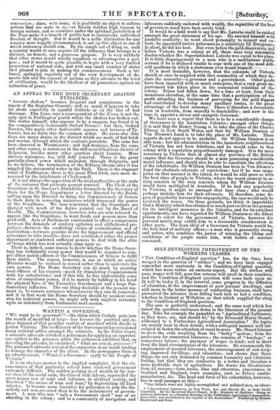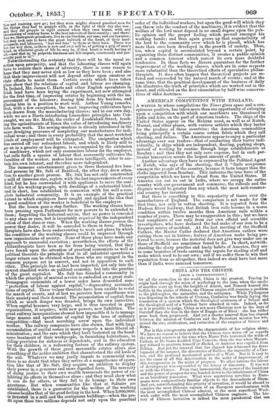SELF-DEVELOPING IMPROVEMENT OF THE WORKING CLASSES. "Tire Condition-of-England question" has,
for the time, been merged in the question of " strikes " • and we have been engaged
somewhat more anxiously in the "strikes"; question
which has worn rather an ominous aspect. But the strikes will pass, wages will fall, poor-law returns will swell in their numbers, and the Condition-of-England question will come back ioii us.' It will be lucky if, in the interval, some progress in the diffusion of education, in the improvement of poor persons' dwellings, and still more in the better manner of conducting business, shall have prevented the labourer from falling back into so bad a condition, whether in Ireland or Wiltshire, as that which supplied the sting to the Condition-of-England question.
The case is perfectly understood ; and the same zeal which has raised the question continues down to the literature of the present day. Take for example the pamphlet on "Agricultural Labourers, as they were, are, and should be," by the Reverend Harry Stuart, addressed to a Forfarshiro Agricultural Association." Its topics are mainly local in their details, with a colloquial manner well cal- culated to fasten the attention of rural hearers. Mr. Stuart labours to show the evils resulting from the "bothy" system ; from the preference for unmarried labourers ; the remains of "bondage," or compulsory labour ; the payment of wages in kind ; and in short from the hard circumstances of the labourers. He recommends the employment of married labourers, the encouragement of cow-keep- ing, improved dwellings, and education; and shows that those things are not only demanded by common humanity and Christian feeling, but that they are conducive to a better and therefore a more profitable state of agriculture. He draws his illustrations from all sources—from books, blue and otherwise, experiences in Scotland and England, town examples such as Price's candle-
manufactory, 8.:c. The head and force of exhortation, however, lies in such passages as this-
" Our fathers were not highly accomplished and polished men, as educe-
.
• "Agricultural Labourers, as they Were, Are, and Should Be, in their Sociel Condition. By the Reverend Harry Stuart, A.M. Minister of Oathlaw. Being alf Address delivered to a General Meeting of the Fokarabire Agricultatral Assooiatiottr June 1853; and published at the request of the Association." ruhRshed by Messy). Blackwood and Sons.
tion and t,rinin,g, w go; but they were mighty shrewd practical men for the things they to grapple with, as the light of their day also was ; soa they did grapple in right earnest when they once began, with any threatening of coming harm to the best interests of their country; and there- fore we, tbeirgreat-grandsons, live in our freedom, our ease, and our luxuries ; but they, took care to have the great bulwark of the heart, of their land- eeeepents an labourers, 4 leal and true' to them at their back. There was but one way then, as there is now and ever will be, of getting a grip of man's heart, in whatever grade of life he may be, if that heart is worth having at all,—and that ie,' by palpable kindness and felt respect, courteously and per- sonally paid to it." Notwithstanding the certainty that there -will be the usual re- action ripen prosperity, and that the labouring classes will again have to endure their share of adversity, there is some reason to hope that they may never sink so low as they have been ; and also that their improvement will not depend either upon amateur or state efforts to assist them. Certain events which have taken place show that the relations of capital and labour are changing. In Ireland, Mr. James C. Kerte and other English speculators in Irish land have been trying the experiment, not now attempted for the first time, of improving estates by beginning with the im- provement of the labourer; freeing him from his burdens, and placing him in a position to work well. Arthur Young remarks, that, with a few exceptions, the most improving cultivators have been drawn from the manufacturing classes; and in our own day, while we see a Harte introducing Lancashire principles into Con- naught, we see Mr. Mechi, the cutler of Leadenhall Street, teach- ing the agriculturists of Essex the value of introducing machinery into farm work. The sewing-machine is already introduced in the more drudging processes of completing our manufactures for indi- vidual wear; and there is every probability that the most wretched kinds of employment will be extirpated. The emigration which has carried off our redundant labour, and which is likely still to go on in a greater or less degree, is accompanied by the extension of machinery, which not only economizes labour for the employer, but calls forth a species of labour that necessarily cultivates the faculties of the worker, makes him more intelligent, abler to sus- tain his own interest, and therefore more independent.
The immense entertainment given to three thousand five hun- dred persons by Mr. Salt of Bradford, the other day, drew atten- tion to another great process. Mr. Salt has not only constructed a mill of immense size, replete with the last improvements of every kind, but he has surrounded it with appliances to serve the com- fort of his working-people, with dwellings of a substantial kind ; and in short, has established in connexion with his mill a com- plete industrial community. It is an example of the practical extent to which employers have caught and applied the idea that a good condition of the worker is beneficial to the employer.
But the lesson goes a step further. The working classes have been pressing upon Parliament for new powers to be extended to them; forgetting the historical axiom, that no power is conceded to any class or race, but is invariably acquired by the independent action of that class or race. When the working classes possess the power they desire, it will be conceded to them in form. Philan- thropists have also been endeavouring to work out plans by which the condition of the working classes could be improved through new organizations of society. None of those plans have made any approach to successful execution ; nevertheless, the efforts of the philanthropists have been so far from being wasted, that they have forced upon the attention of practical economists as well as political theorists the principle that in all industrial operations a larger return can be obtained when those who are engaged in the common purpose act in concert, and not in opposition to each other. This principle has at last been imported, not only into the newest standard works on political economy, but into the practice of the great capitalist. Mr. Salt has founded a community in which the principle of mutual service is embodied on a great scale. Demagogue economists of a lower order have, demanded some "protection of labour against capital,"—deprecating accumula- tions of capital. These vulgar theorists have been unable to resist the march of events, and at last we perceive how superfluous was their anxiety awl their demand. The accumulation of capital, from which so much danger was dreaded, brings its own corrective. When capital becomes very large, and is thus invested in great organizations, it acquires, with new powers, new liabilities. The great railway incorporations showed how impossible it is to manage large masses and operations of capital by the laws of ordinary competition—that most searching screw upon the individual worker. The railway companies have also shown, that with large accumulation of capital comes in many respects a more liberal ad- ministration; and the care which they have bestowed on the hand- some treatment of their workpeople, in furnishing habitations, in aiding provision for sickness or dependents, and in the education for their children is a redeeming feature of the railway system. With the growth of these great mercantile estates arises also something of the nobler ambition that characterized the old lords of the soil. Whateier we may justly impute to commercial men, there is no doubt that when they arrive at a magnificence of opera- tion like that of Mr. Salt, they acquire an ambition to display their power in a generous and more dignified form. The necessity or doing justice to their own wealth transcends the power of ex- hibiting its effects in themselves alone ; and they must show what it can do for others, or they fail to do homage to their own neatness. But when communities like that at Saltaire are establisbed, there is a guarantee for the welfare of the working okaseabesides that of the good feelingin the lord. When 2,000,000/. 1.1eVeta hi a mill and the contiguous buildings—when the pro- fit 'upon these two millions depends not only upon the punctual
order of the individual workers, but upon the good-will which they can throw into the conduct of the machinery, it is evident that the welfare of the lord must depend in no small degree upon the pub- lic opinion and the proper feeling which prevail amongst his working hands ; and thus again grows up that responsibility of the lord to the community over which he is placed, which has more than once been developed in the growth of society. Thus, too, when capital is accumulated beyond a certain point, by organizing these distinct communities, it creates a public opinion and a common interest which correct its own more doubtful tendencies. In these facts we discern guarantees for the further improvement of the working classes, which are in some respects more substantial than the theoretical efforts of speculative philan- thropists. It does often happen that theoretical projects are re- futed and superseded by the natural march of events ; and at the same time, that the practical development of the business of daily life illustrates the truth of principles which are worked out in the closet, and ridiculed on the first enunciation by half-wise conserva- tives of older doctrines.



























 Previous page
Previous page